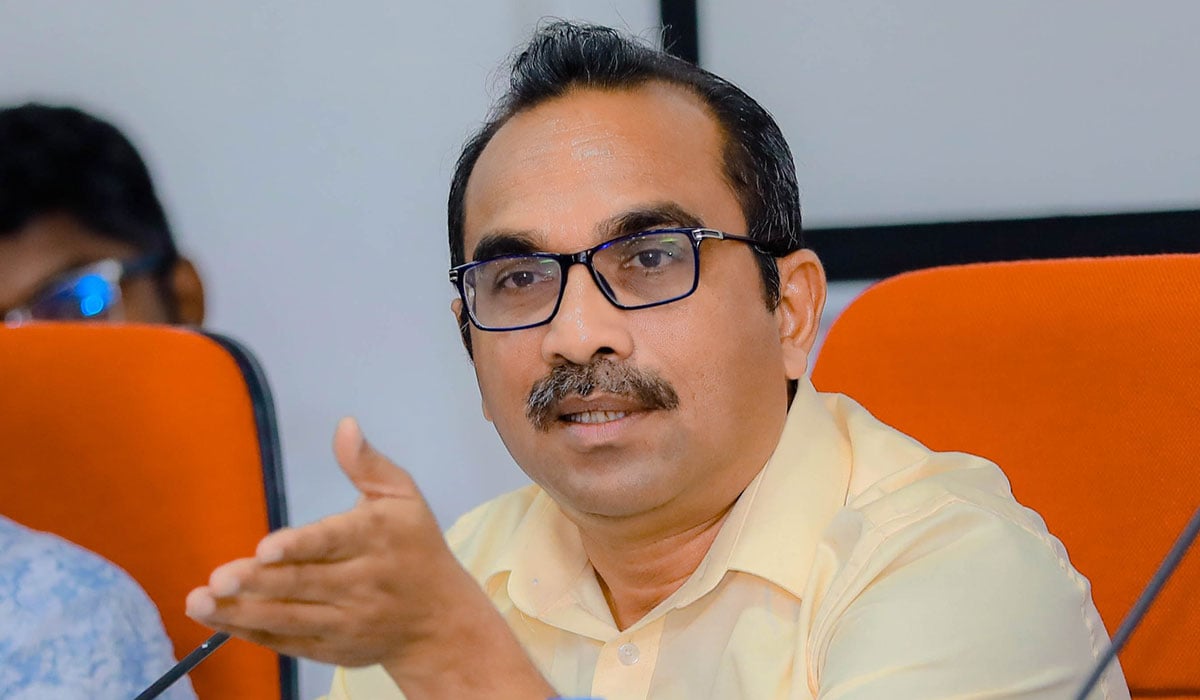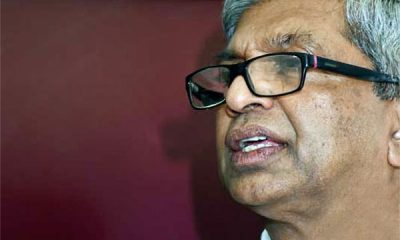News
Lacille poses pertinent questions to Parliament, UNDP

‘Forty MPs skipping DDO vote inexcusable’
By Shamindra Ferdinando
Former Director, Administration of Parliament Lacille de Silva said that both Parliament and the United Nations Development Programme (UNDP) should reveal whether they were satisfied with the progress in the ongoing project funded by the latter to improve the parliamentary system.
De Silva said that parliamentary standards had deteriorated to such an extent over the years that he was amazed by the recent reportage of the UNDP funding a House project to improve the Sectoral Oversight Committee (SOC) system.
Responding to The Island queries, de Silva said that actually members of Parliament, regardless of the party they represented, should have raised the issue. The civil society activist said that he was particularly worried about the failure on the part of the Opposition to seek a clarification from Speaker Mahinda Yapa Abeywardena.
Lacille de Silva served as Director, Administration of Parliament, from 2003 to 2013, during his 37-year career. Having retired in
2013, de Silva, in 2015, received appointment as Secretary to the Special Presidential Commission of Inquiry to Investigate and Inquire into Serious Acts of Fraud, Corruption and Abuse of Power. The then President Maithripala Sirisena however sacked him in early March 2016.
Referring to the UNDP arranging former Canadian MP Kevin Deveaux described as an international expert on parliamentary development to meet Speaker Mahinda Yapa Abeywardena on June 14 at the Parliament premises, de Silva declared that there was no harm working with international partners to improve systems in place. UNDP Resident Representative in Colombo Azusa Kubota accompanied Devaaux. That was followed by Kubota meeting President Ranil Wickremesinghe at the Presidential Secretariat where an assurance was given on the UNDP’s continued assistance, particularly to further improve SOC system. USAID, too, supports some projects implemented by parliament.
A senior House official said that Speaker Abeywardena presides over an advisory board meant to handle all activities assisted by development partners. The former Canadian lawmaker has been here on the invitation of the UNDP to do what the official called the needs assessment in consultation with relevant parties to prepare the parliamentary development action plan in collaboration with all partners. The official added that the current action plan was prepared in consultation with the former Canadian MP during Gotabaya Rajapaksa’s tenure as the president. Declaring that the Speaker is the final authority, the official emphasized that Parliament didn’t follow anyone’s agenda.
Lacille de Silva asked whether political parties represented in parliament needed any external advice to take remedial measures to overcome shortcomings and negligence. Statements issued by parliament on regular proceedings at watchdog committees exposed the pathetic failure on the part of parliament to address issues at hand. The recent revelation at COPA (Committee on Public Accounts) that the total arrears of taxes, penalties and interest due to the Inland Revenue Department by Dec 31, 2022 is Rs. 904 bn underscored the responsibility on the part of Parliament, de Silva said.
“Public finance is the responsibility of Parliament. Therefore, the House cannot absolve itself of the responsibility for allowing accumulation of total arrears to over 904 bn,” de Silva said. “What really worries me is that even after the national economy suffered in early 2020 due to a toxic combination of reasons, those in authority haven’t made a genuine effort to improve revenue collection.”
The debate and vote on the high profile resolution pertaining to the Domestic Debt Optimization (DDO) on July 01 highlighted the crisis in parliament. Referring to accusations directed at Speaker Abeywardena that he arbitrarily conducted the vote at 7.30 pm on Saturday though the original plan was to conduct a two-day debate before the vote, de Silva said that only 184 voted that day.
“Therefore, 41 didn’t vote. If we leave out the Speaker, 40 MPs skipped the vote. This shows, some political parties are in disarray. How come 40 MPs refrained from taking a stand on such a crucial issue,” de Silva said, adding that the bone of contention is whether political parties have no control of its members.
Current Parliament is represented by 15 political parties. Parliament consists of SLPP 145, SJB 54, ITAK 10, JJB 03, EPDP 2, AITC 02 and an MP each represents nine political parties.
News
Development Officers threaten to intensify their protest

Protesting Development Officers continued their hunger strike near the Presidential Secretariat, Colombo yesterday (01), for the seventh consecutive day.The protesters, who are members of the Lanka School Development Officers’ Association, are demanding that they be absorbed into the teacher service as they have served as teachers in state-run schools for nearly seven years.
Secretary of the Association, Viraj Manaranga, said the protesters were seeking an urgent meeting with the President. He added that a presidential aide had visited the protest site and offered to arrange for a meeting with the President on 03 Feb., but the union insisted on an earlier date. Manaranga warned that failure to grant a meeting could trigger a massive protest in Colombo today (02).
Four officers participating in the hunger strike have been hospitalised due to deteriorating health, while two more joined the fast on Saturday (31).
In a bid to raise awareness of their grievances, on 30 January a delegation of the All Island Development Officers’ Association visited Most Venerable
Warakagoda Sri Gnanarathana Thera, Mahanayake of the Asgiriya Chapter, and subsequently with the Chapter’s Registrar, Ven. Dr. Medagama Dhammananda Thera. The prelates said promises that had been made to them should be fulfilled.
The protest began on 26 January as a satyagraha, after authorities failed to respond to repeated requests to integrate the officers into the teaching service. The escalation into a fast-unto-death underscores the protesters’ frustration over the prolonged delay
by Pradeep Prasanna Samarakoon
News
Auditor General to be appointed tomorrow

The long-vacant post of Auditor General would be filled on 03 Feb., after months of controversy and delays, Minister of Transport, Highways and Urban Development Bimal Rathnayake said on Friday (31) in Kandy.
The Constitutional Council met at the Parliamentary complex on Friday to discuss the appointment but failed to reach a decision on a suitable candidate. The President had previously proposed four names on four separate occasions, all of which were rejected. The Council is now set to consider the fifth nominee.
The post has remained vacant since April 2025, following the retirement of Chulanta Wickramaratne, who served as the 41st Auditor General. More than 10 months have passed without a permanent appointment.
Sources said a female officer in the Auditor General’s Department has been nominated again, though her previous recommendation was rejected due to some allegations against her.
Meanwhile, senior audit officer Dharmapala Gammanpila, with 31 years of service and the department’s most senior official, has received backing from the Mahanayake Theras of the three Nikayas, the Maha Sangha, and several civil society groups for appointment as the 42nd Auditor General.
Sources noted that the three civil society representatives on the Constitutional Council will play a crucial role in the final decision.
by Chaminda Silva and SK Samaranayake
News
Two arrested for aiding and abetting murder

Two 18-year-old youth were arrested by the Southern Division of the Western Province Crime Division on 31 January for allegedly aiding and abetting two murders carried out in Dehiwala and Kohuwala. ICE (crystal meth) was found in their possession at the time of arrest.
The suspects are residents of Mount Lavinia and Boralesgamuwa, according to the police. They are accused of having helped carry out a murder at a hotel in the Dehiwala Police Division on 9 January, 2026, and an attack on a person travelling in a three-wheeler at Bodhiyawatta, Kohuwala, on 12 December, 2025.
Police said the charges included sending photographs of the victims to a criminal living overseas.
Investigations revealed that the youth had acted under the direction of a criminal known as Sando.
Under the guidance of Janaka Kumara, Director of the Southern Division of the Western Province Crime Division, investigations are being led by Police Inspector Hemanta Kumara, assisted by Sub-Inspectors Prasanna Gunathilaka and Prasanna (40248), and Constables Chaminda (72987), Anil (79598), Kumar (88762), and Senanayake (19363), who are continuing the probe.
by Norman Palihawadane and Chaminda Silva
-

 Business4 days ago
Business4 days agoClimate risks, poverty, and recovery financing in focus at CEPA policy panel
-

 Opinion3 days ago
Opinion3 days agoSri Lanka, the Stars,and statesmen
-

 Business2 days ago
Business2 days agoHayleys Mobility ushering in a new era of premium sustainable mobility
-

 Business2 days ago
Business2 days agoAdvice Lab unveils new 13,000+ sqft office, marking major expansion in financial services BPO to Australia
-

 Business2 days ago
Business2 days agoArpico NextGen Mattress gains recognition for innovation
-

 Business1 day ago
Business1 day agoAltair issues over 100+ title deeds post ownership change
-

 Business1 day ago
Business1 day agoSri Lanka opens first country pavilion at London exhibition
-

 Editorial2 days ago
Editorial2 days agoGovt. provoking TUs

















